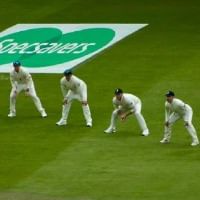England all-rounder Nat Sciver-Brunt had the rarest of rare reasons for missing the first WT20I against Pakistan in May 2024. While some are unable to play due to injury, fatigue, workload management, or any other personal reason, Sciver-Brunt was unavailable because she was undergoing egg-freezing treatment.
The majority of women's cricketers prioritize their careers over building a family, in their 20s and early 30s. By the time they have wrapped up their endeavors on the field, and wish for a family, the body does not permit it, at least not naturally. Luckily, science has advanced a great deal in this regard over the years.
The in-vitro fertilization (IVF) method was a breakthrough in the late 1970s, and egg freezing is another provision that has come about to carry out parenthood on one's own terms. The process is also a boon for same-sex couples like Nat Sciver-Brunt and her partner Katherine Sciver-Brunt.
The pair had announced that they are expecting their first child, with Katherine carrying the baby after fertility procedures. The retired England international is currently in her second trimester, while Nat Sciver-Brunt also wishes to experience the journey of motherhood after she ends her cricketing career.
“I guess I’m lucky enough to start a family and still be able to play. Over the last probably three or four years, we’ve had a few changes and improvements in terms of our contracts and the sort of provisions for players who want to have a child and come back, or their partner has a child and what that means logistically," Nat Scover-Brunt said in an interview with The Telegraph.
“I always wanted to freeze my eggs to probably use them when I finished my cricket. I didn’t know if as I get older, whether playing, then having a baby and coming back might be a bit more tricky," she added.
She further revealed that her decision to freeze her eggs has sparked a conversation in the England dressing room, with several of her colleagues considering the same non-traditional route to prolong their careers.
"It’s probably more the girls who are 26, 27 and above. Because I was the same when I was 23, you know. Happy in my bubble, playing cricket and having a great time. It didn’t feel relevant to me. But still having the conversation and talking about it now will keep it in their minds if the time comes when, or if, they would like to do it," Sciver-Brunt said.
The current England side have two same-sex couples in the form of Danielle Wyatt, who got married to Georgie Hodge recently, and the other duo comprises of Maia Bouchier and Jess Grimson. Former England player Sarah Taylor also announced in December 2023 that her partner Diana was pregnant.
"The whole thing for me took about three-and-a-half, four weeks" - Nat Sciver-Brunt on the egg-freezing process
The initial steps in the process involve administering hormones that proliferate and sync up the production of eggs. After tracking the movement and position of the eggs through ultrasound, they are extracted for storage.
"The whole thing for me took about three-and-a-half, four weeks. I took injections [self-administered] for two-and-a-half weeks and then you go under sedation for the egg extraction. And then for the next week it’s sensible to not do too much," Nat Sciver-Brunt explained in the aforementioned interview.
“You’re injecting yourself with hormones to make your eggs grow, so you’re pretty uncomfortable. Returning to training I was told to listen to my body and not push too hard. And to be honest, I wouldn’t have wanted to,” she concluded.
The purpose of freezing is that when the time is right, the eggs can be retrieved from storage, thawed, and used for fertilization and transferred back into the body.
Looking for fast live cricket scores? Download CricRocket and get fast score updates, top-notch commentary in-depth match stats & much more! 🚀☄️
